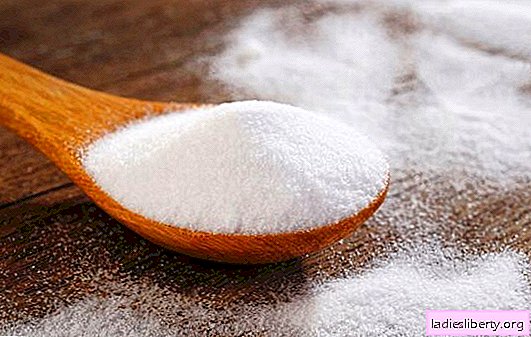
Calcium Chloride is a calcium salt of hydrochloric acid, which is registered as a food supplement E509. Available in the form of ampoules with 10% solution of 5 ml and 10 ml.
It is used for a lack of calcium in the body, helps to balance metabolic processes and improve the general condition.
Useful properties of calcium chloride
Calcium is an indispensable macrocell necessary for the normal functioning of various organs and systems. It is needed for the correct formation of dental or bone tissue, is involved in many processes:
• prevents blood clots and clogging of blood vessels, thereby improving heart rate;
• contributes to normal muscle contraction and transmission of nerve impulses, eliminates cramps and cramps, numbness of the limbs;
• improves the work of the adrenal glands, pancreas and thyroid gland, normalizes hormonal levels, stimulates the endocrine and immune system, increases resistance to viral and bacterial infections;
• participates in water-salt metabolism, protects cell membranes from deformation, accelerates tissue regeneration;
• helps to restore the function of the kidneys and urinary system, shows diuretic properties, reduces swelling;
• during menopause helps to reduce the "flushing" and other manifestations of menopause.
In its pure form, calcium is not absorbed in sufficient quantities, so it is used in combination with other components (calcium gluconate, calcium lactate, calcium carbonate, calcium citrate). To replenish calcium reserves in the body, it is recommended to use calcium chloride, which is well absorbed at any age.
Main indications and methods of use
The greatest need for the drug occurs with a lack of calcium, during periods of increased psychophysical stress, in the recovery period. Calcium deficiency is especially dangerous in adolescence, when the musculoskeletal system changes and grows very quickly.
The drug is prescribed in such cases:
• in the treatment of nephritis and kidney disease;
• in case of dermatological problems, including in adulthood, it stops inflammation of the skin;
• for poisoning with fluoride and magnesium salts;
• with significant blood loss (nosebleed, pulmonary, uterine, in the gastrointestinal tract);
• to maintain the body under stress or in the rehabilitation period after illness and surgery.
The drug is taken orally or intravenously through a dropper or injection. The dosage of the drug depends on the situation and the general condition of the person: the daily dose is 10-15 ml, the drug should be taken 2-3 times a day after meals (1 ampoule of 5 ml). Powdered calcium chloride requires special storage conditions, it melts in air at temperatures above 34 ° C, so use a ready-made solution to the beam.
A solution of calcium chloride is used for intravenous injection as prescribed by a doctor, usually the drug is diluted with sodium chloride or glucose 5% and administered gradually. When administered intravenously, a person feels strong heat throughout the body (the so-called "hot injection") and a chalky taste in the mouth. Perhaps a temporary decrease in blood pressure, urges to nausea, arrhythmia and tachycardia.
After the injection, you should be in a supine position for 20-30 minutes and control blood pressure.
Calcium chloride for healing the body
The product is used internally or externally (for cleansing and rejuvenating the skin, for washing damaged areas and mucous membranes).
• In gynecology, calcium chloride is prescribed in the treatment of endometritis (inflammation in the uterine mucosa). The drug helps to reduce intense bleeding during menstruation, relieves cramping and pain.
• Very often this remedy is used to eliminate allergy symptoms along with such well-known drugs as Diprazin, Loratadil, Tavegil, Suprastin, Fenistil. The attending physician selects the optimal combination of antihistamines and calcium chloride. This helps to cleanse the body and neutralize the action of allergens, restores breathing and heart rate.
It is used in such cases: an allergy to antibiotics and other drugs, allergic dermatoses, hay fever, rhinitis, an acute reaction to the introduction of serum proteins.
• Use this drug in home cosmetology for the preparation of peelings, lotions and cleansing masks.
In its pure form, a solution of calcium chloride 5% is used to cleanse the skin in this way: the face is cleaned of cosmetics or washed, dried with a towel or dry towel. The solution from the ampoule is applied to a cotton pad or swab, wipe the face and neck, repeat this action 3-4 times until the remedy is over. After a couple of minutes, a wet swab is passed along the bar of toilet soap and begins to process the skin with gentle movements to make soap flakes. After that, you need to wash thoroughly with warm water.
The procedure can be repeated no more than once a week. If you feel uncomfortable, reddening or burning, rinse immediately with water and apply a softening cream or oil. If the soap does not interact with calcium chloride, then try another one that reacts with this tool and helps deeply cleanse the pores. Facial skin acquires a smooth, well-groomed appearance, small wrinkles are smoothed out.
• The enrichment of fermented milk products with calcium occurs in this way - for the preparation of calcined cottage cheese you need to take 1 liter of milk and 3 ampoules of a solution of 10 ml.
Heat the milk to 40 degrees (it should seem warm if dripped onto the skin). While stirring milk, pour in a solution of calcium chloride and bring the milk to a boil. After boiling, immediately remove from the stove and cool. Then separate the curd from the whey: put in a colander or in a sieve with a pad of gauze. Do not drain the whey, but use it to make fruit smoothies or baked goods.
Contraindications to the use of the drug
An overdose of calcium chloride has a harmful effect on the body and can lead to the following consequences: thirst, nausea, dizziness and weakness, muscle pain, frequent urination, and digestive upset.
The drug is contraindicated in such cases:
• hypersensitivity to the drug;
• atherosclerosis and pathology of the cardiovascular system;
• urolithiasis and acute diseases of the urinary system;
• chronic renal failure;
• simultaneous use with cardiac glycosides (the preparation of calcium chloride enhances the cardiotoxic effect).
Caution during pregnancy and lactation, under the constant supervision of a physician.
Subcutaneous or intramuscular administration of the drug is not allowed, since this can lead to a violation of capillary blood supply and soft tissue necrosis. Despite the over-the-counter sale of the drug in pharmacy chains, one should carefully evaluate its potential benefits and harmful effects, and preliminary allergy testing should be performed during external manipulations.











